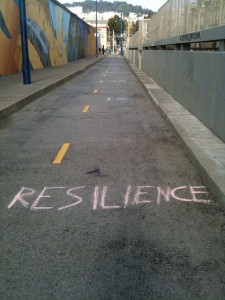
Creative commons license miz_ginevera https://www.flickr.com/photos/ginevra/4603670503
Resilience is the ability to bounce back from a tough situation. Most of us are pretty resilient. That doesn’t mean we don’t experience stress, sadness, anxiety and a host of other emotions when something bad happens, but over time we adapt. This is particularly important when we’re faced with a situation that will continue for some time, such as caring for a loved one with dementia.
Someone is resilient if they show no obvious sign of distress in the face of a significant challenge (such as caregiving); continue to actively engage in life; and see their life as positive, full of meaning, and satisfaction.
The good news is that resilience is something that we can learn and foster in ourselves and others. This is one takeaway from a recent article in Aging & Mental Health that examines resilience in individuals caring for a spouse with dementia.
The authors interviewed 13 women and 7 men who were caring for a spouse with dementia. They identified eight of these caregivers as resilient although caregivers in general had both resilient and non-resilient characteristics.
Similar to research I discussed in my last post, resilient caregivers were able to maintain continuity with their previous life, stayed positive, and frequently relied on humor in their approach to life and their interactions with their loved one. They tended to use the experience of caregiving as an opportunity to learn about dementia and develop new caregiving skills. Having more disposable income was helpful because it contributed to a better quality of life overall, but money alone wasn’t enough to foster resilience.
Most important to me, caregivers fostered resilience through their interactions with community and societal resources. This included support from family and friends as well as broader social participation.
For example, participation in dementia support groups and the friends made through those connections were particularly important because of the ability to share experiences and expertise with others who understand what they are going through.
Resilient caregivers were more likely to recognize their own limitations. When they needed a break, resilient caregivers took advantage of day care, respite care, and home help. In fact, the use of respite care was an important factor distinguishing resilient from non-resilient caregivers. Caregivers who didn’t use respite care said they unaware of the service, did not know how to access it, or did not feel like they were ready to use it.
This suggests to me that health and social service professionals who interact with caregivers can do a better job of educating them about the availability of these services, how they can access it, and the importance of using these types of support services early, before they are burned out.
Next week I’ll share some useful resources for caregivers and how to find them in your community.
In the meantime, what supports have helped you stay resilient as a caregiver?
Subscribe to get this blog sent directly to your email inbox.

Leave a Reply